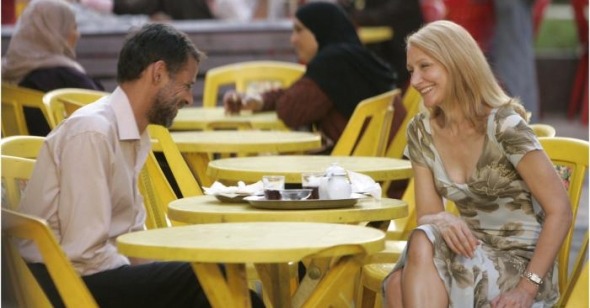In Love and Bore
By Kristi Mitsuda
Cairo Time
Dir. Ruba Nadda, Canada/Egypt, IFC Films
Canadian writer-director Ruba Nadda’s Cairo Time, like her last feature, Sabah: A Love Story, superficially explores Arab and Western relations on a microcosmic scale, as played out in a romance between a man and woman gazing at one another from across the cultural divide. In this case they’re Tareq (Alexander Siddig) and Juliette (Patricia Clarkson); the former picks up the latter from the airport upon her arrival in Egypt after her husband, Mark (Tom McCamus), is waylaid in Gaza due to his work with the U.N., derailing a long-planned vacation together. For the first third of the film at least, the narrative doesn’t seem as though it’ll follow the expected love story trajectory; rather than plow straight ahead with the forging of the relationship, it wanders in not uninteresting if ultimately facile and unfulfilling ways.
As Mark’s situation stretches out for days, Juliette goes out and about on her own. Curiously naïve for a supposedly worldly magazine editor about walking around blond and bare-headed, not to mention bare-armed and bare-legged, in a Muslim country, she seems surprised at the hordes of staring and following men. Such scenes are indicative of the generally clumsy illustrations of culture clash Nadda attempts. The filmmaker also strives to create relationships between Juliette and other women she meets as she roams the city and country in order to tease out a sense of female solidarity amidst the usual sea of men. At a dinner, she meets Kathryn (Elena Anaya), whose boyfriend also works for the U.N., and ends up day-tripping with her to the White Desert, and, later, on a bus ride in an ultimately failed attempt to reach Mark, she strikes up a quick bond with a young Egyptian girl named Jameelah (Mona Hala). Jameelah is visibly amazed to hear that Juliette still talks to her daughter even though the latter is single and road-tripping on her own—it’s already clear here that the film is working too hard to put into relief the different cultural norms at play.
A subplot involving Jameelah appears on the verge of developing when she asks Juliette to deliver a letter to her lover after the bus is held up at a military checkpoint (and the white woman is the only one allowed to leave). But as is the case with the momentary rapport with Kathryn, this meeting turns out to be a red herring—the fast friendships are revealed as merely plot ploys so that Nadda can take the viewer on tourist trips first through the desert (complete with a camel and cute local kids) and then a carpet factory to find Jameelah’s lover (where Nadda can insert some pointed commentary about child labor issues in the country); nothing else comes of the encounters. Stories set abroad necessarily take advantage of their settings, but Cairo Time’s pointed guided tour precludes any sense of natural unfolding. And the usually captivating Clarkson seems oddly dull and disengaged from her surroundings when the narrative calls for her character to become progressively more tuned in to and turned on by the city.
Aiming for a sensual slowness, Cairo Time is instead full of odd fits and starts. A brief, dreamy episode has Juliette donning a hijab and exploring a mosque on her own, and one wonders where the film might’ve gone from here if it instead explored the individual wanderings of a woman unexpectedly alone in a foreign country. When Tareq first takes Juliette on a boat ride on the Nile, you sense he does so out of obligation to his former colleague. But slowly, the movie stacks the building blocks of the relationship: the two share a hookah—Juliette’s first time—and play a game of chess, which inevitably lead to long walks around the marketplace and town. Music plays over postcard-pretty scenes; the pyramids gleam incredibly in the background.
Yet though Juliette and Tareq share numerous cups of coffee and tea, the sense of quiet understanding that develops between them feels unearned. In contrast to, say, the Before Sunset/Sunrise films—which also center on a cross-cultural couple falling in love abroad—conversations are few and not particularly illuminating, and there’s no organic chemistry between the couple to explain their constant, silent smiles at one another. Attractive female and male are simply capitulating to cinematic convention. More worthwhile might’ve been the tale of a long-married woman seized by passion and then savoring and dealing with the awakening of it—this fleetingly seems like a possibility, but ultimately a path not taken. That Cairo Time means to be taken as a love story is without doubt, as a concluding and predictable shared moment between the leads disappointingly confirms. It’s hard to fault a film that seeks to unite Western and Arab cultures, even if only in momentary, fictional love and understanding. But Cairo Time’s uninspired unraveling doesn’t do much to show us the way toward enlightenment.
